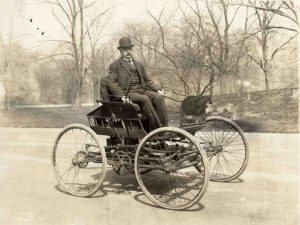Technology progresses. Most of the time, progress is good, sometimes bad, but in all times it creates new circumstances, and those circumstances have winners and losers. Our society is not good at recognizing when circumstances have changed. We tend to take, for a long time at least, the world-as-it-is as the world-as-it-ought-to-be.
But I see no reason it must be so. I wish we were better at evaluating our reality, deciding if we like it or want something else, and then, coming to consensus on what, if anything, should be done at a policy level to control our circumstances.
For example, remote control airplanes have been around for quite some time. They were rather expensive toys, and not easy to fly. Similarly, aerial photography has existed almost since the dawn of flight. Because paying a pilot of fly over some location for you and photograph it is not cheap, it tends to be done where value of the resulting photograh is high enough to justify the expense.
For whatever reasons, we were pretty much OK with that status quo and the laws surrounding it. For example, yes, someone could photograph you through your window, and a passing plane could catch you sunning in your yard. People do not like those thigns, but it was hard enough to do and easy enough to stop, that basically, everyone but celebs and paparazzi seemed fine with the world as it was.
Enter inexpensive, simple aerial photograph with UAVs. Today, anybody with a few hundred bucks can get aerial imagery, and in a few years, that might be $10’s or even $1’s. Whole new possibilities for surveillance open up and people are suddenly uncomfortable about their vulnerability.
Does this mean we need laws to stop aerial surveillance “abuse?” Or maybe we need to adjust our expectations of privacy? I dunno. We need to evaluate the situation anew, since technology has changed circumstances. The fact that the existing laws were fine does not mean they are fine.
 I can think of lots of contemporary examples of this sort of change: facial recognition along with ubiquitous video cameras make it possible to track everyone, everywhere they show their faces. License plate reader technology allows someone to track everywhere you go. You could do the same before, with detectives or private eyes, but now it can be done in bulk, cheaply. Cookies on websites allow someone to track most of what you look like on the Internet. In essence, people’s expectation of privacy was actually the complex combination of the state of technology and the law together, not either separate from the other.
I can think of lots of contemporary examples of this sort of change: facial recognition along with ubiquitous video cameras make it possible to track everyone, everywhere they show their faces. License plate reader technology allows someone to track everywhere you go. You could do the same before, with detectives or private eyes, but now it can be done in bulk, cheaply. Cookies on websites allow someone to track most of what you look like on the Internet. In essence, people’s expectation of privacy was actually the complex combination of the state of technology and the law together, not either separate from the other.
None of these technologies are sinister in and of themselves, but dropped into a an environment that was in legal equilibrium without them, I think we should expect that equilibrium to shift.
 Of course, there are historical examples of such adjustments. Prior to the ubiquity of the automobile, people did not need carriage licenses, nor did they need to carry liability insurance for carriage accidents. How long after cars became popular did we realize they were dangerous enough and important enough that we should require that drivers get training? I think most (though not all) people today regard drivers’ licenses as a good idea. A few decades after that, we started requiring drivers to carry liability insurance and today most states have some requirement, though it is amazingly low in some places. (I know that agreement is hardly universal that liability requirements are a good idea, but we have them.)
Of course, there are historical examples of such adjustments. Prior to the ubiquity of the automobile, people did not need carriage licenses, nor did they need to carry liability insurance for carriage accidents. How long after cars became popular did we realize they were dangerous enough and important enough that we should require that drivers get training? I think most (though not all) people today regard drivers’ licenses as a good idea. A few decades after that, we started requiring drivers to carry liability insurance and today most states have some requirement, though it is amazingly low in some places. (I know that agreement is hardly universal that liability requirements are a good idea, but we have them.)
One contemporary problem that is not typically considered in this light is gun violence. One might say that extremely capable weapons have been available for a long time, but that they have been expensive enough and just tricky enough to obtain, that we, as a society, were comfortable with the status quo. Collectors and sportspeople had them, and they used them safely, more or less. Enter cheap, easily available weapons, and all of a sudden the game has changed. In fact, today you can 3D print a gun at home, and maybe in a few years you’ll be able to 3D print a most of a not-too-shabby automatic weapon. The technology is not going to go away, but because of the technology change, the status quo is going to shift. Can or should we try to shift it back?
My point is that I think there are many people who advocate for a kind of technological determinism, suggesting, “well, tech marches on.” But history tells us that we clearly do not have to accept such outcomes if we don’t want them.
Freedom-loving readers will notice a whole lot of “we’s” in this essay. I’m afraid they’re right. I’m suggesting that the group sometimes make decisions that restrict an individual’s freedoms. I know there is a cost to that. But I also see costs in letting individuals restrict the freedom (and well-being) of many other individuals.
As always, practicality and balance will be hard to achieve. We all seem fine with driver’s licensure, but pet grooming licenses seem perhaps too far. Required liability coverage for drivers is OK, but we probably would not tolerate such a requirement for many other potentially dangerous-to-others activities.
I hope we will have spirited, informed debates on issues like privacy and autonomy and that the outcome, if not new norms and laws, are new, explicit reiterations of existing norms that were previously implicit.
Karl Benz was issued the first German driver license in 1888, by 1909 they were a requirement (from a picture I took at the Mercedes museum in Stuttgart a few days ago; I would post it but that doesn’t seem possible here).
That sounds like a cool museum, and it’s especially interesting that the company selling the cars was the one that created the driver license.
In general, I do not thing putting restrictions and licensure requirements on everything new is a good idea at all. You have to think it through on a case-by-case basis. But I do think there are some opportunities in front of us today to make the world a bit better for most by setting a few careful restrictions.